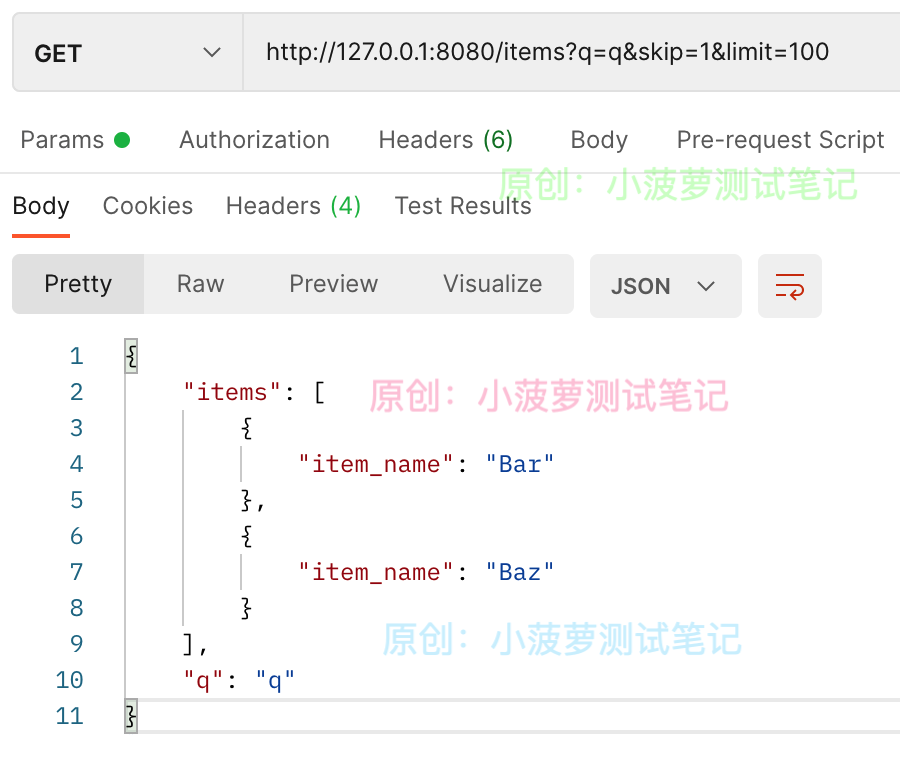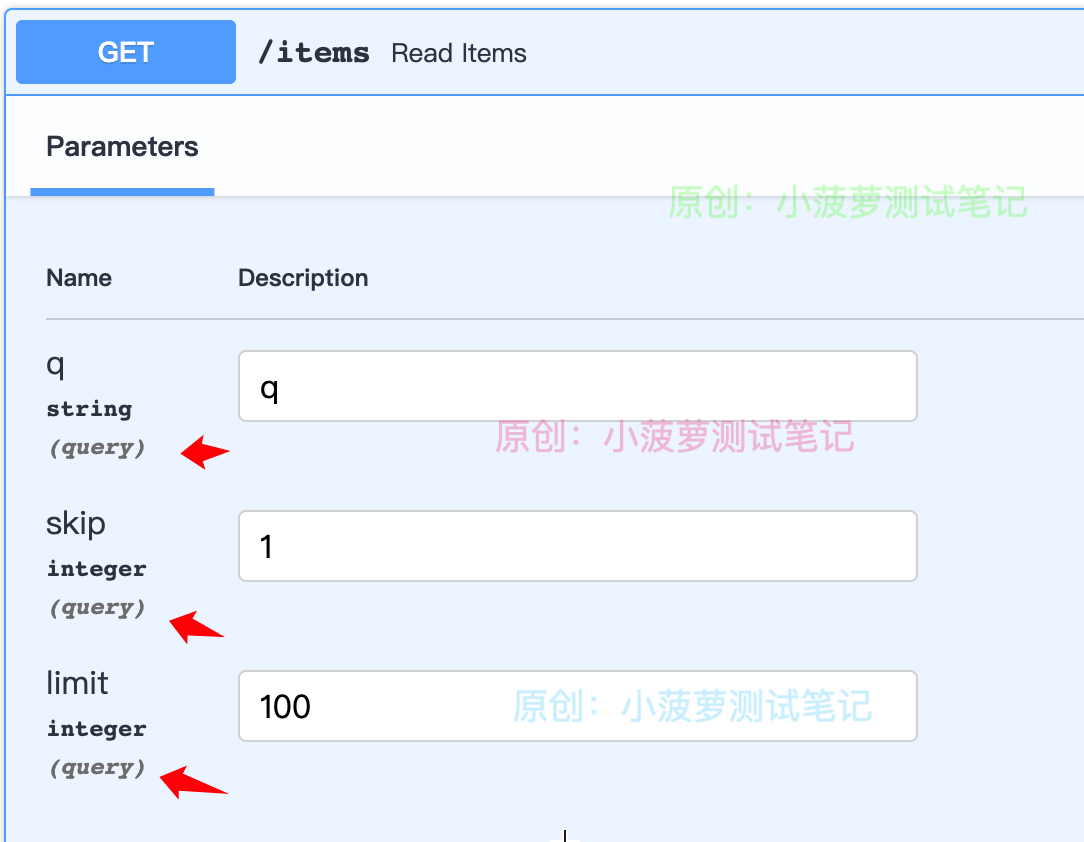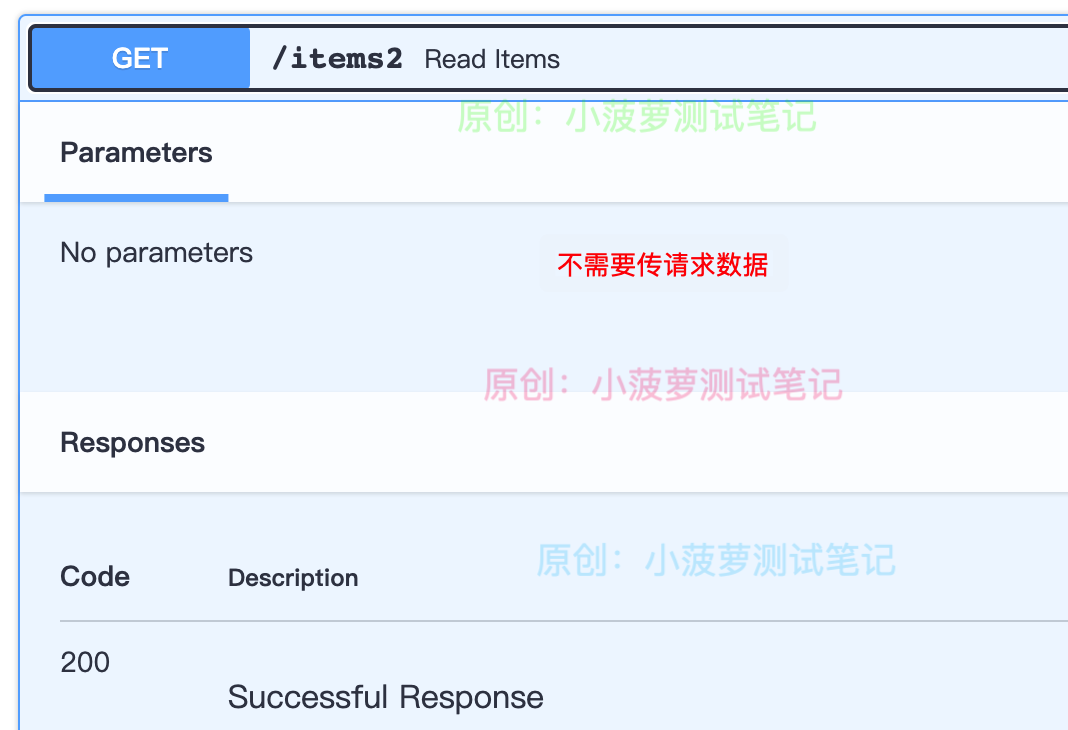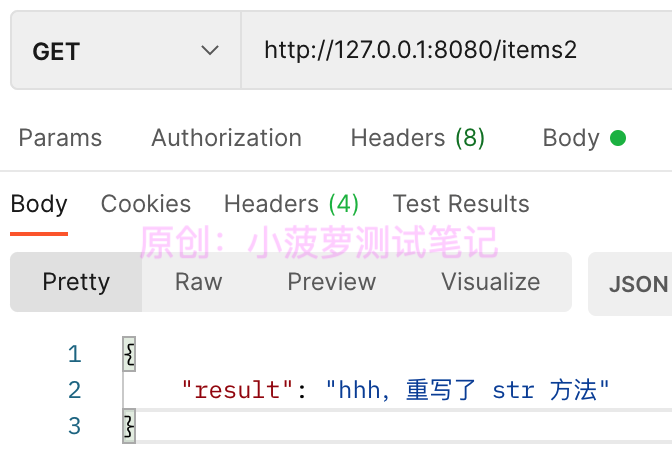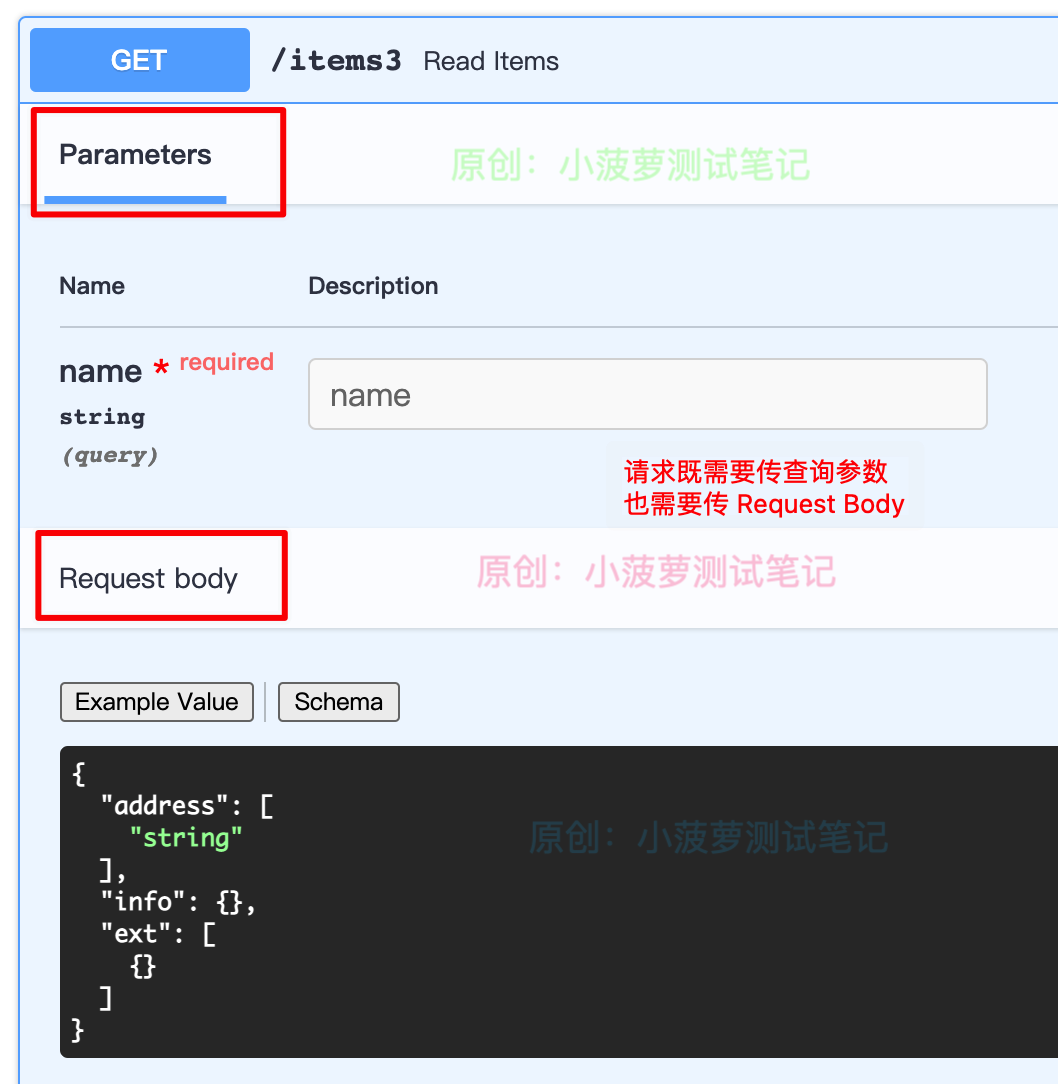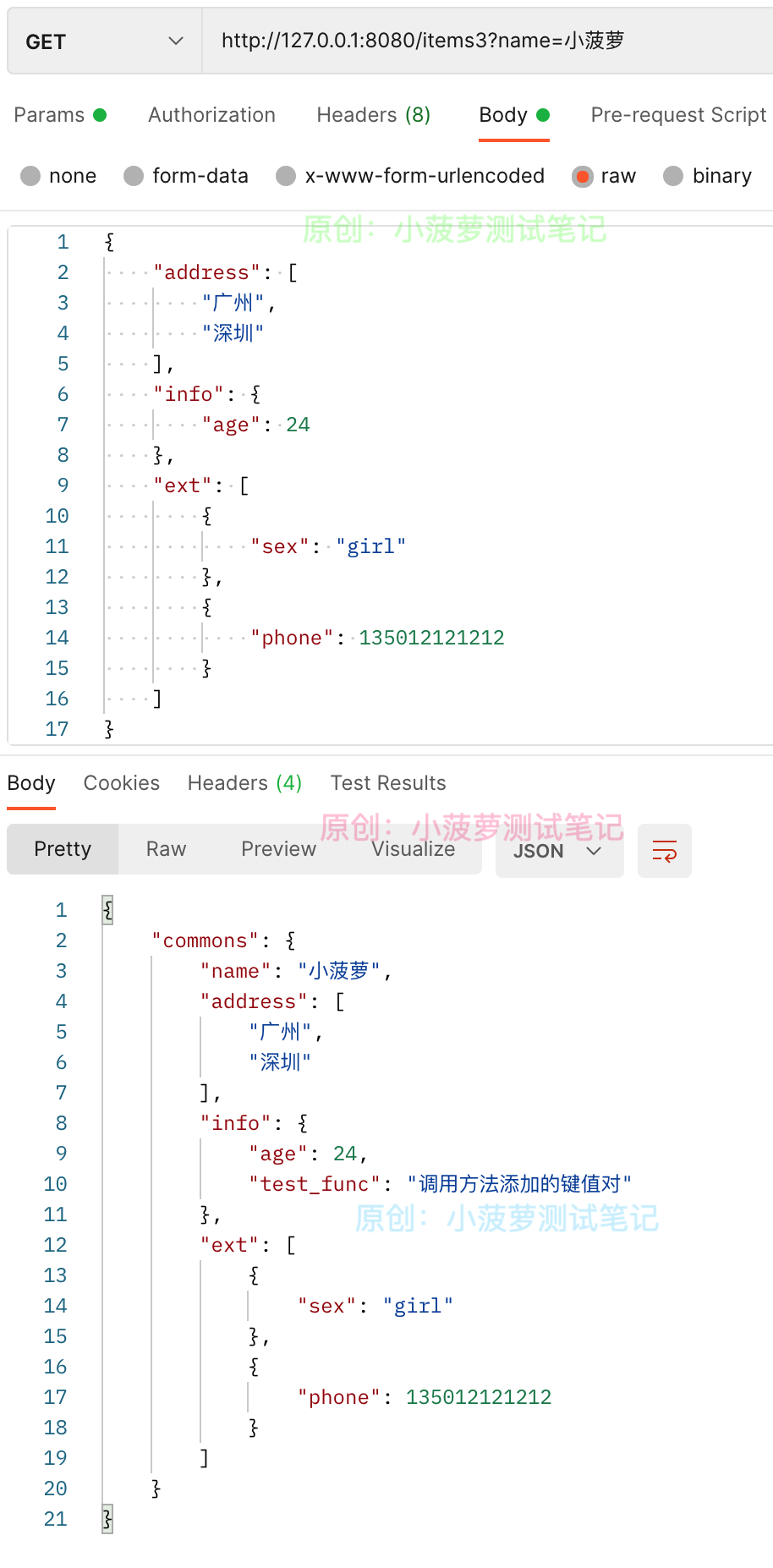FastAPI (30) - Classes as Dependencies class dependency injection
Dependency function returns dict
The return value type of dependency function in the previous dependency injection article is dict

#!usr/bin/env python # -*- coding:utf-8 _*- """ # author: Little pineapple test notes # blog: https://www.cnblogs.com/poloyy/ # time: 2021/9/24 1:08 PM # file: 25_dependency.py """ from typing import Optional, Dict, Any # 2. Import dependencies from fastapi import Depends, FastAPI import uvicorn app = FastAPI() # 1. Write dependencies async def common_parameters(q: Optional[str] = None, skip: int = 0, limit: int = 100): # Return to dict return {"q": q, "skip": skip, "limit": limit} # 3. Write the path operation function, and the parameters are declared as dependencies @app.get("/items") async def read_items(commons: dict = Depends(common_parameters)): return commons if __name__ == "__main__": uvicorn.run(app="25_dependency:app", host="127.0.0.1", port=8080, reload=True, debug=True)
The dependency function returns a dict, and then the path operation function's parameter commons gets a dict, but the IDE does not support more code intelligent prompts because the types of keys and values cannot be known
Soul question: what is a dependency?
- The chestnut above is to declare functions as dependencies, but this is not the only way to declare dependencies (although it will be more common)
- The key point should be that dependencies are callable
- In Python, callable is an object that can be called like a function
Object oriented__ call__ () tutorial
Look at the source code of dependencies()
The first parameter dependency type is Callable and must be a Callable object
Class as a dependency
Is a class a callable object?

from typing import Callable class Cat: def __init__(self, name: str): self.name = name # Determine whether the class object is a callable object print(isinstance(Cat, Callable)) # Output results True
So classes can be declared as dependencies!
Actual code

#!usr/bin/env python # -*- coding:utf-8 _*- """ # author: Little pineapple test notes # blog: https://www.cnblogs.com/poloyy/ # Time: 7:58 pm on September 24, 2021 # file: 26_class_dependency.py """ from typing import Optional, Dict, Any # 2. Import dependencies from fastapi import Depends, FastAPI import uvicorn app = FastAPI() # Simulation database fake_items_db = [{"item_name": "Foo"}, {"item_name": "Bar"}, {"item_name": "Baz"}] # 1. Class as a dependency class CommonQueryParams: # Still three parameters def __init__(self, q: Optional[str] = None, skip: int = 0, limit: int = 100): self.q = q self.skip = skip self.limit = limit # 2. Declare dependencies () @app.get("/items") async def read_items(commons: CommonQueryParams = Depends(CommonQueryParams)): response = {} # Simulate reading data from the database items = fake_items_db[commons.skip: commons.skip + commons.limit] response.update({"items": items, "q": commons.q}) return response if __name__ == "__main__": uvicorn.run(app="26_class_dependency:app", host="127.0.0.1", port=8080, reload=True, debug=True)
a key
- When making a request, you need to__ init__ () to pass parameters
- The request data is passed to the initialization method of the class (_init_)
- The value type received by the commons parameter is CommonQueryParams
Request result for correct parameter transmission
View Swagger API documentation
Three ways to write classes as dependencies
commons: CommonQueryParams = Depends() commons: CommonQueryParams = Depends(CommonQueryParams) commons = Depends(CommonQueryParams)
- Standard writing is the second
- But the first one is recommended. It is the abbreviation of the second one
- The third type is not recommended because the parameter does not specify a type, and the IDE will not have code intelligent prompt
commons: CommonQueryParams = Depends()
- This is the shortcut to Commons: commonqueryparams = dependencies (commonqueryparams)
- If the dependency is a class, it is recommended to write it in this way, because the FastAPI will automatically call the dependency class to create an instance object of the class itself
Dependent class__ init__ Method has no arguments

class NoInitClass: def __str__(self): return "hhh,Rewritten str method" @app.get("/items2") async def read_items( # Use the first recommended way to declare dependencies commons: NoInitClass = Depends() ): return {"result": str(commons)}
View Swagger API documentation
Request result
Dependent class__ int__ Method has parameters of type Dict and List

from typing import List, Dict, Any, Optional from fastapi import Depends from fastapi.encoders import jsonable_encoder # Dependent class class DictListClass: def __init__(self, *, name: str, address: Optional[List[str]] = None, info: Optional[Dict[str, Any]] = None, ext: Optional[List[Dict[str, Any]]] = None ): self.name = name self.address = address self.info = info self.ext = ext # Example method def test(self): self.info.update({"test_func": "Key value pair added by calling method"}) @app.get("/items3") async def read_items( # Use the first recommended way to declare dependencies commons: DictListClass = Depends() ): # Print it and see what commons are print(commons, type(commons)) # Call instance method commons.test() commons = jsonable_encoder(commons) # What are the converted commons after printing print(commons, type(commons)) return {"commons": commons}
View Swagger API documentation
Request result for correct parameter transmission
After the request, view the console output
<26_class_dependency.DictListClass object at 0x10d20ff40> <class '26_class_dependency.DictListClass'>
{'name': 'Little pineapple', 'address': ['Guangzhou', 'Shenzhen'], 'info': {'age': 24, 'test_func': 'Key value pair added by calling method'}, 'ext': [{'sex': 'girl'}, {'phone': 135012121212}]} <class 'dict'>
- You can see that before the conversion, commons is an instance object of the "DictListClass" class
- jsonable_ The converted commons of the encoder is a dict (jsonable_encoder is really powerful)
Code prompt after declaring dependencies with {Commons: dictlistclass = dependencies()
Not only is the code elegant and concise, but there are still IDE code tips
- Author: Little pineapple test notes
- Link to this article: https://www.cnblogs.com/poloyy/p/15332555.html

